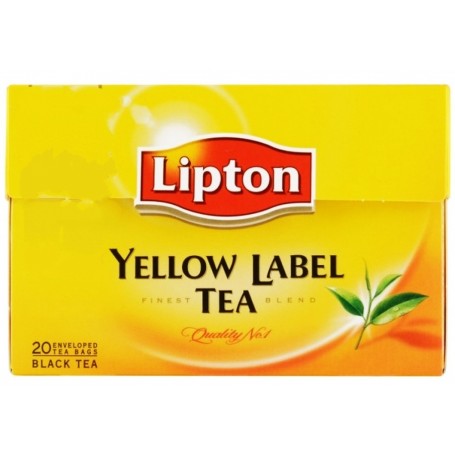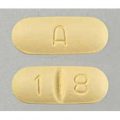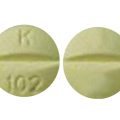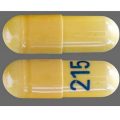In 1871, Thomas Lipton (1848–1931) of Glasgow, Scotland used his small savings to open his own shop, and by the 1880s the business had grown to more than 200 shops. Shortly after opening his shop, Thomas Lipton began travelling the world for new items to stock. One of such item was tea, a rare and expensive luxury at the time.
Lipton Yellow Label is a type of black tea crafted to include carefully selected and fresh-pressed tea leaves, capturing as much natural tea taste as possible. Lipton Yellow Label Black Tea has real tea leaves specially blended to enjoy hot or iced. Enjoy Lipton Yellow Label Black Tea iced as the perfect addition for any of your meals because it is naturally tasty and refreshing.
Lipton Yellow Label has been sold since 1890, when Thomas Lipton introduced the first version of the Yellow pack with a red Lipton shield, still in use. It is sold in 150 countries worldwide. Lipton Yellow Label is a blend of several types of tea, sold both in tea bags and as loose tea, rolled into small balls like gunpowder green tea.
Lipton Yellow Label Tea Side Effects
Negatively affect iron absorption
Tea is a rich source of a class of compounds called tannins. Tannins can bind to iron in certain foods, rendering it unavailable for absorption in your digestive tract. Iron deficiency is one of the most common nutrient deficiencies in the world, and if you have low iron levels, excessive tea intake may exacerbate your condition. Research suggests that tea tannins are more likely to hinder the absorption of iron from plant sources than from animal-based foods. Thus, if you follow a strict vegan or vegetarian diet, you may want to pay extra close attention to how much tea you consume.
Caffeine from Lipton tea can increase stress and anxiety
Tea leaves naturally contain caffeine. Overconsuming caffeine from tea, or any other source, may contribute to feelings of anxiety, stress, and restlessness. An average cup (240 ml) of Lipton yellow label tea contains about 11–61 mg of caffeine, depending on the variety and brewing method. Black teas like Lipton yellow label tea tend to contain more caffeine than green and white varieties, and the longer you steep your tea, the higher its caffeine content.
Effect on sleep
Because tea naturally contains caffeine, excessive intake may disrupt your sleep cycle. Melatonin is a hormone that signals your brain that it’s time to sleep. Some research suggests that caffeine may inhibit melatonin production, resulting in poor sleep quality. Inadequate sleep is linked to a variety of mental issues, including fatigue, impaired memory, and reduced attention span. What’s more, chronic sleep deprivation is associated with an increased risk of obesity and poor blood sugar control. Certain compounds in tea may cause nausea, especially when consumed in large quantities or on an empty stomach.
Tannins in tea leaves are responsible for the bitter, dry taste of tea. The astringent nature of tannins can also irritate digestive tissue, potentially leading to uncomfortable symptoms, such as nausea or stomach ache. The amount of tea required to have this effect can vary dramatically depending on the person. More sensitive individuals may experience these symptoms after drinking as few as 1–2 cups (240–480 ml) of tea, whereas others may be able to drink more than 5 cups (1.2 liters) without noticing any ill effects.
Heartburn
The caffeine in Lipton yellow label tea may cause heartburn or aggravate preexisting acid reflux symptoms. Research suggests that caffeine can relax the sphincter that separates your esophagus from your stomach, allowing acidic stomach contents to more easily flow into the esophagus. Caffeine may also contribute to an increase in total stomach acid production.
Risk in Pregnancy
Exposure to high levels of caffeine from beverages like Lipton yellow label tea during pregnancy may increase your risk of complications, such as miscarriage and low infant birth weight. Data on the dangers of caffeine during pregnancy is mixed, and it’s still unclear exactly how much is safe. However, most research indicates that the risk of complications remains relatively low if you keep your daily caffeine intake under 200–300 mg. That said, the American College of Obstetricians and Gynecologists recommends not exceeding the 200-mg mark.
Headache
Intermittent caffeine intake may help relieve certain types of headaches. However, when used chronically, the opposite effect can occur. Routine consumption of caffeine from Lipton yellow label tea may contribute to recurrent headaches. Some research suggests that as little as 100 mg of caffeine per day could contribute to daily headache recurrence, but the exact amount required to trigger a headache can vary based on an individual’s tolerance. SEE: Ahamed Tea: Health Benefits and Side Effects






